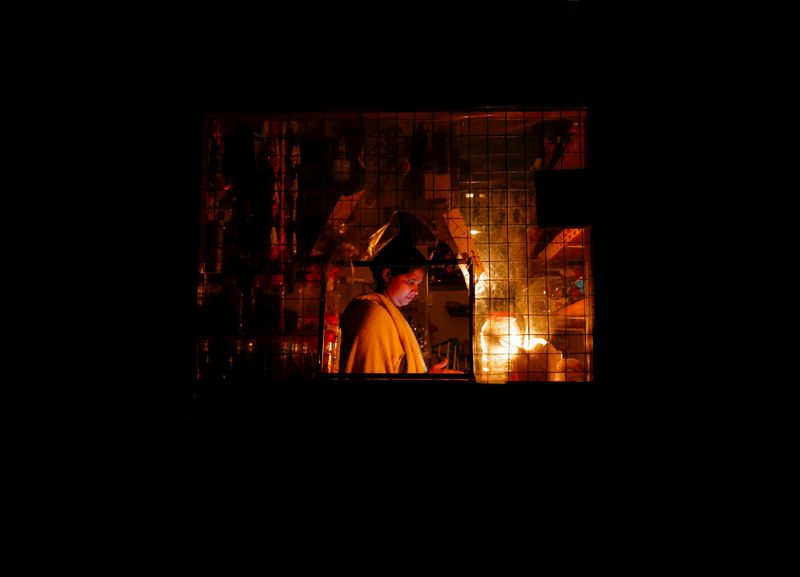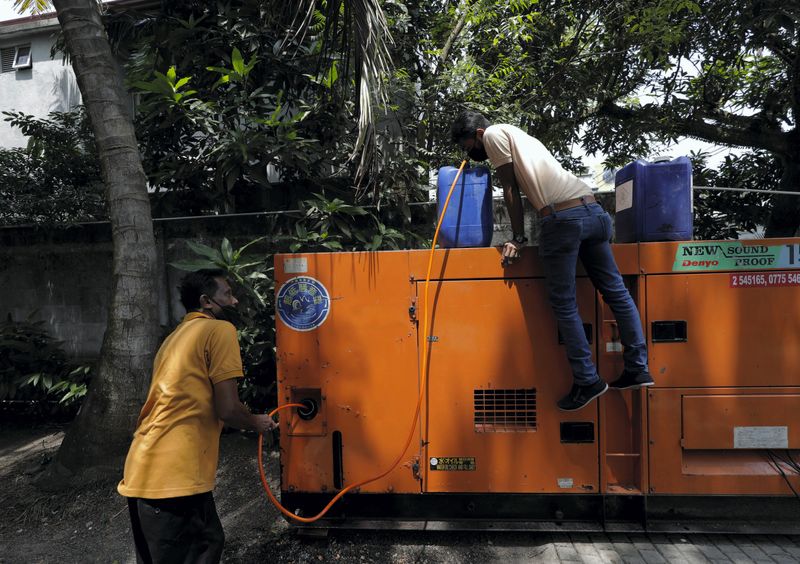By Uditha Jayasinghe
COLOMBO (Reuters) - Sri Lankans faced 10-hour power cuts on Wednesday and warnings of longer blackouts on Thursday, as a deepening economic crisis roiled markets and the electricity regulator urged more than a million government employees to work from home to save fuel.
The island nation has been unable to pay for fuel shipments because of a foreign exchange shortage, and is poised to seek assistance from the International Monetary Fund (IMF).
"We made a request to the government to allow the public sector, which is about 1.3 million employees, to work from home for the next two days so we can manage the fuel and power shortages better," Janaka Ratnayake, Chairman of the Public Utilities Commission of Sri Lanka, told Reuters.
Power cuts would be extended to 13 hours on Thursday, Sri Lanka's power regulator said in a statement.
Amid the country's worst economic crisis in decades, foreign exchange reserves have fallen by 70% in the past two years and were down to a paltry $2.31 billion as of February, leaving Sri Lanka struggling to import essentials, including food and fuel.
The drawn-out power cuts on Wednesday were partly caused by the government's inability to pay $52 million for a 37,000 tonne diesel shipment that was awaiting offloading, Ratnayake said.
"We have no forex to pay," he said, warning of more power cuts over the next two days. "That is the reality."
'CAN'T SEE END OF TUNNEL'
Sri Lankan shares closed 3.6% lower on Wednesday, after falling more than 7% during the day, prompting the Colombo Stock Exchange to halt trading twice.
Udeeshan Jonas, Chief Strategist at equity research firm CAL Research, said the market was responding to a deepening of a crisis set off by badly-timed tax cuts, the coronavirus pandemic and historically weak government finances.
"Investors can't see the end of the tunnel," he said.
To seek a way out of the crisis, Finance Minister Basil Rajapaksa is set to visit Washington in April for talks with the IMF. The Fund's assessment published on Friday said Sri Lanka was experiencing a combined balance of payments and sovereign debt crisis, and would need a "comprehensive strategy" to make its debt sustainable.
If Sri Lanka secures an IMF programme it would be its 17th financial rescue package from the global lender.
Harpo Gooneratne, a restaurateur in Sri Lanka's main city of Colombo, said that even though some of his 10 restaurants had their own generators, the diesel shortage made it difficult to run his business during power cuts.
"Its crazy," he said.
The worsening electricity cuts will hit already struggling businesses, especially exporters that have locked in orders and limited capacity to absorb cost increases, said Dhananath Fernando, an analyst at Colombo's Advocata Institute think tank.
"This will further hurt Sri Lanka's growth and threaten foreign exchange earnings that are crucial to improve reserves, repay debt and pay for essential imports," Fernando said.

Gooneratne said there were 30% fewer customers at his restaurants and they were spending less.
"Even when people go out they are cautious about their spending," he said. "The person who earlier had two beers will now only have one."
